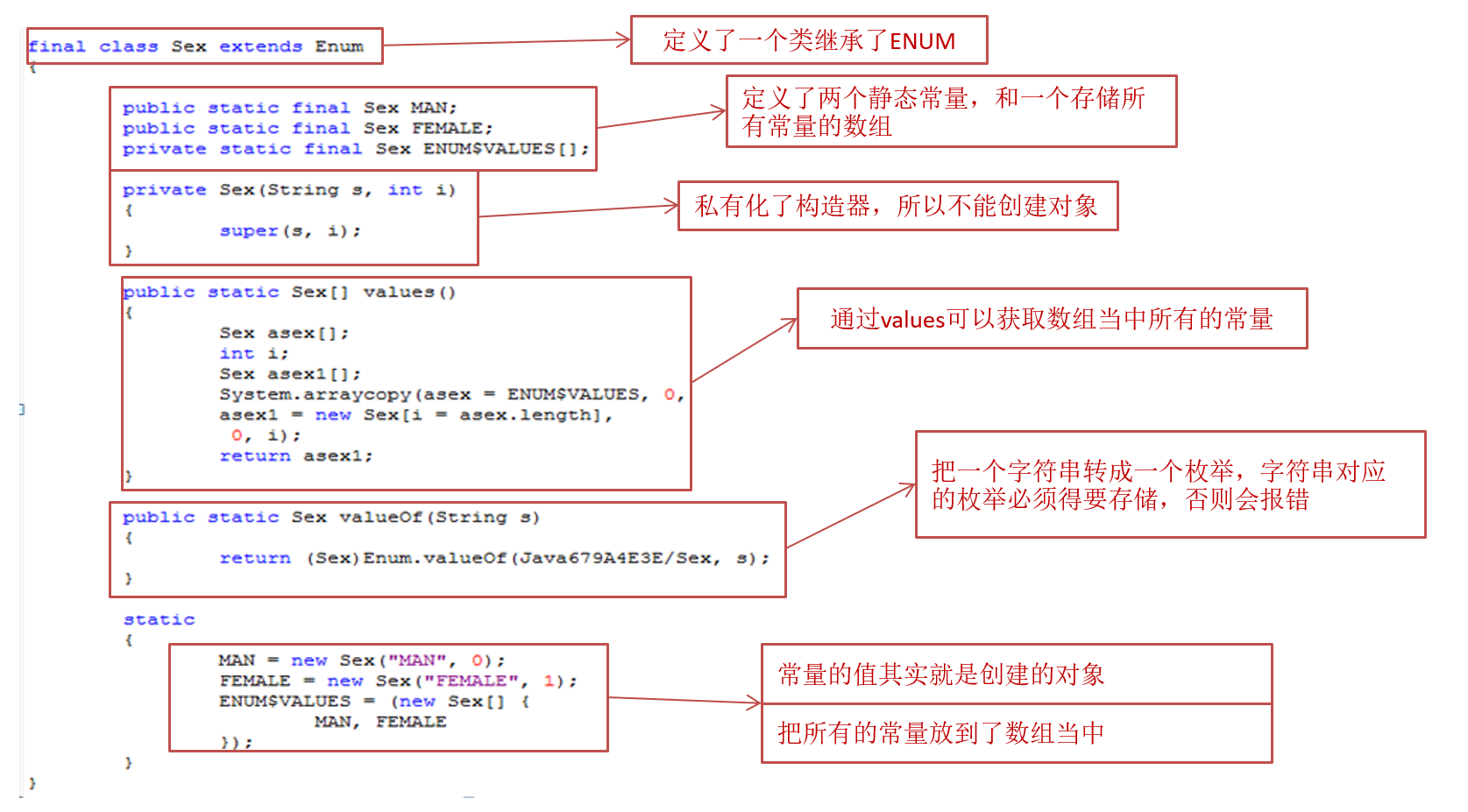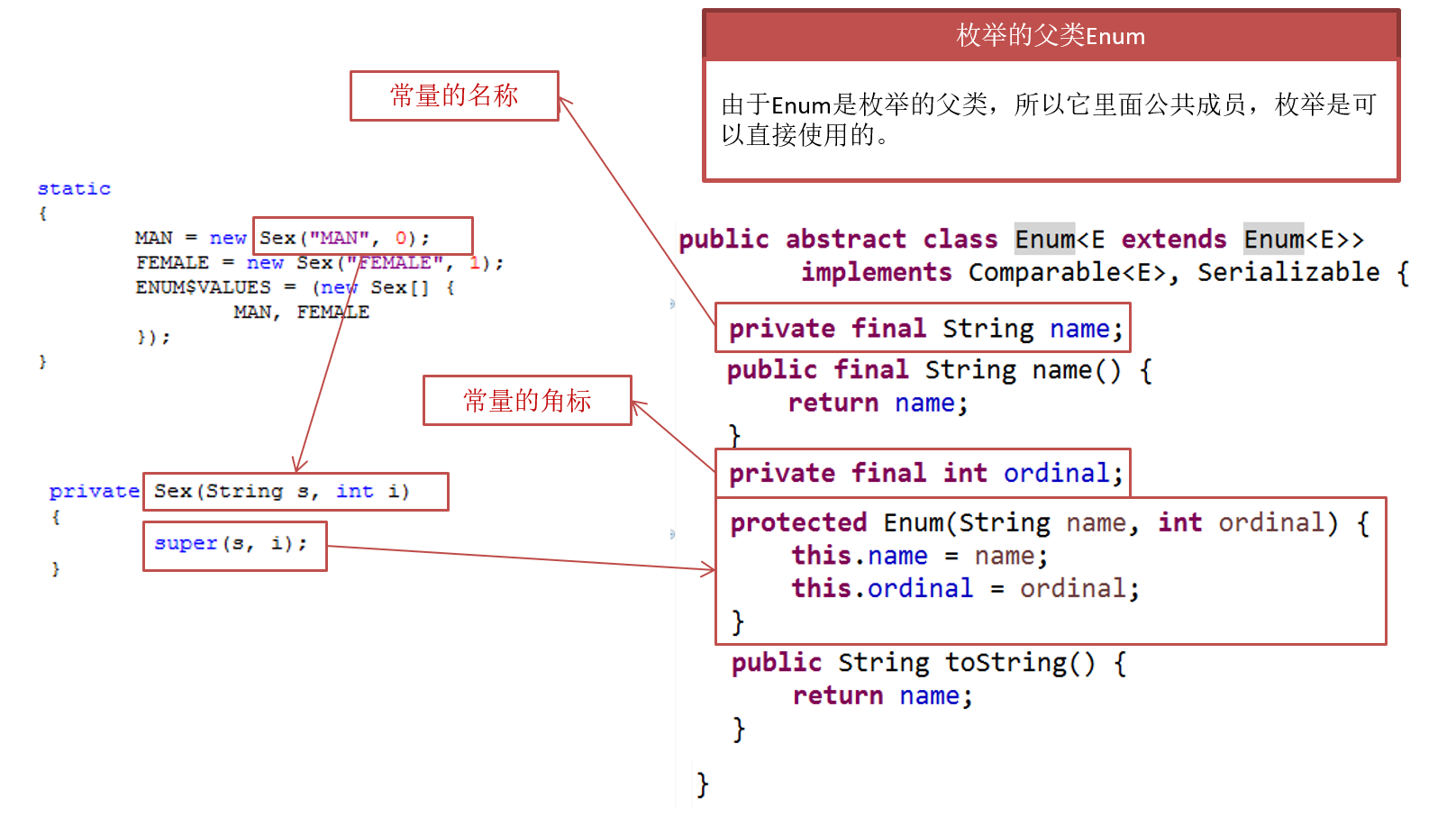枚举
枚举的引入(模拟枚举)
class Student {
private int restDay;
public int getRestDay() {
return restDay;
}
public void setRestDay(int restDay) {
this.restDay = restDay;
}
}
public class Test {
public static void main(String[] args) {
Student stu = new Student();
stu.setRestDay(1);
int res = stu.getRestDay();
if (res == 6 || res == 7) {
System.out.println("放假");
} else {
System.out.println("上课");
}
}
}上面的代码,存在一些问题:
(1)数据不安全,输入8
stu.setRestDay(8); // 输出:上课(没有星期八)(2)业务逻辑不合理:中外一周的第一天不一样,中国第一天是周一,外国第一天是周天。
改进后:
class WeekDay {
public static final int MONDAY = 1;
public static final int TUESDAY = 2;
public static final int WEDNESDAY = 3;
public static final int THURSDAY = 4;
public static final int FRIDAY = 5;
public static final int SATURDAY = 6;
public static final int SUNDAY = 7;
}
class Student {
private int restDay;
public int getRestDay() {
return restDay;
}
public void setRestDay(int restDay) {
this.restDay = restDay;
}
}
public class Test {
public static void main(String[] args) {
Student stu = new Student();
stu.setRestDay(WeekDay.MONDAY);
int res = stu.getRestDay();
if (res == 6 || res == 7) {
System.out.println("放假");
} else {
System.out.println("上课");
}
}
}改进后的代码,还存在问题:
(1)数据不安全,输入8
stu.setRestDay(8); // 输出:上课(没有星期八)再次改进:
class WeekDay {
private WeekDay() {}
public static final WeekDay MONDAY = new WeekDay();
public static final WeekDay TUESDAY = new WeekDay();
public static final WeekDay WEDNESDAY = new WeekDay();
public static final WeekDay THURSDAY = new WeekDay();
public static final WeekDay FRIDAY = new WeekDay();
public static final WeekDay SATURDAY = new WeekDay();
public static final WeekDay SUNDAY = new WeekDay();
}
class Student {
private WeekDay restDay;
public WeekDay getRestDay() {
return restDay;
}
public void setRestDay(WeekDay restDay) {
this.restDay = restDay;
}
}
public class Test {
public static void main(String[] args) {
Student stu = new Student();
stu.setRestDay(WeekDay.MONDAY);
WeekDay res = stu.getRestDay();
if (res == WeekDay.SATURDAY || res == WeekDay.SUNDAY) {
System.out.println("放假");
} else {
System.out.println("上课");
}
}
}上面的代码,问题解决了,但是代码不好看,太冗余。
什么是枚举
枚举:表示一个事物固定状态。
比如:季节(春,夏,秋,冬)、星期(周一到周日)、性别(男,女)
枚举的定义
格式:
扫描二维码关注公众号,回复:
6847836 查看本文章


[修饰符] enum 枚举的名称 {
常量1,常量2,常量3……
}比如:
enum Sex {
MAN, FEMALE
}枚举的本质
java 枚举是一个语法糖。是一个特殊的类,是多个常量对象的集合。
当我们定义一个枚举后,它的本质还是一个类,一个继承了Enum的类。
enum Sex {
MAN, FEMALE
}反编译后:
final class Sex extends Enum
{
public static final Sex MAN;
public static final Sex FEMALE;
private static final Sex ENUM$VALUES[];
private Sex(String s, int i)
{
super(s, i);
}
public static Sex[] values()
{
Sex asex[];
int i;
Sex asex1[];
System.arraycopy(asex = ENUM$VALUES, 0, asex1 = new Sex[i = asex.length], 0, i);
return asex1;
}
public static Sex valueOf(String s)
{
return (Sex)Enum.valueOf(Test/Sex, s);
}
static
{
MAN = new Sex("MAN", 0);
FEMALE = new Sex("FEMALE", 1);
ENUM$VALUES = (new Sex[] {
MAN, FEMALE
});
}
}
